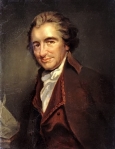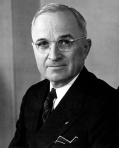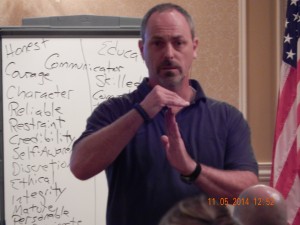 Only a life lived for others is a life worthwhile.
Only a life lived for others is a life worthwhile.
– Albert Einstein
A story is told that during the American Revolution a man in civilian clothes rode past a group of soldiers repairing a small defensive barrier. Their leader was shouting instructions, but making no attempt to help them.
Asked by the rider, he responded with great dignity, “Sir, I am a corporal!” The stranger apologized, dismounted, and proceeded to help the exhausted soldiers. The job done, he turned to the corporal and said, “Mr. Corporal, next time you have a job like this and not enough men to do it, go to your commander-in-chief and I will come and help you again.” The man was none other than George Washington.
Harold S. Geneen said, “Leadership is practiced not so much in words as in attitudes and actions.” And this is the essence of servant leadership. When talk becomes action; when ones purpose as a leader transcends position, and serving others is the norm rather than the exception, that is when leadership is truly understood.
Former President George H. W. Bush was recently asked in a Time magazine interview as to whether he has seen a shift in the past twenty years in the public’s attitude toward service. He replied, “I think so. I hope so. Many schools include a service project as part of their curriculum, and many corporations have in-house projects for their employees or give them time off to do volunteer work. There’s a greater understanding about the importance of giving back.” This is encouraging when you consider how great the need is for servant leaders today.
Creating a culture of servant leadership in business is needed today. Here I offer three simple concepts towards that end and how service can elevate your organization to a higher level.
Service is a model of leadership. The simplest definition of leadership comes from John Maxwell who defines it in one word– influence. A servant leader is one understands that his influence individually can make a difference, but collectively can make a huge impact.
As a leader, when you rally your people, time, and resources around causes greater than yourself, you are modeling the greatest use of leadership. James Freeman Clarke said, “Strong convictions precede great actions.” What great causes are you and your organization rallying around?
Service is the blessing of leadership. Gandhi said, “The best way to find yourself is to lose yourself in the service of others.” The blessing of leadership is found in the meaningful ways you find to enrich the loves of others. It is not always about finding ways to help others who can’t help themselves, although you should. It is also about connecting with those around you to add value in tangible ways.
When was the last time you praised a co-worker for a job well done? How about sending a personal note of encouragement to a colleague going through a slump? When the idea of being a blessing becomes your corporate culture you will move your business into a whole new realm of purpose.
Service is the reward of leadership. Do you want to position your team for greatness? As you set the example of servant leadership within your organization, there will be a buy-in among your team that will have significant meaning.
Jim Rohn said, “Whoever renders service to many puts himself in line for greatness – great wealth, great return, great satisfaction, great reputation, and great joy.” When you become a catalyst for servant leadership it will open doors you never imagined.
Where will you serve today?
© 2011 Doug Dickerson
Doug Dickerson is an award winning columnist and leadership speaker. He is the author of the new book, Leaders Without Borders: 9 Essentials for Everyday Leaders. A Lowcountry resident, Doug is available to speak for your business or civic organization. Visit www.dougsmanagementmoment.blogspot.com for more information.
 … and if this cannot be inspired into our people, in a greater measure than they have it now, they may change their rulers, and the forms of government, but they will not obtain a lasting liberty.”
… and if this cannot be inspired into our people, in a greater measure than they have it now, they may change their rulers, and the forms of government, but they will not obtain a lasting liberty.”
—John Adams, letter to Zabdiel Adams, 1776
 “… that can gather strength from distress, and grow brave by reflection. ‘Tis the business of little minds to shrink; but he whose heart is firm, and whose conscience approves his conduct, will pursue his principles unto death.”
“… that can gather strength from distress, and grow brave by reflection. ‘Tis the business of little minds to shrink; but he whose heart is firm, and whose conscience approves his conduct, will pursue his principles unto death.”
—Thomas Paine, The Crisis, 1776
I just finished reading Valley Forge by Newt Gingrich and William Forstchen. Regardless of your political leanings, it was an excellent read. Incredible character demonstrated by George Washington, Baron Von Steuben, and others to whom we owe so much…
“But when Christ appeared as a high priest of the good things to come, He entered through the greater and more perfect tabernacle, not made with hands, that is to say, not of this creation; and not through the blood of goats and calves, but through His own blood, He entered the holy place once for all, having obtained eternal redemption. For if the blood of goats and bulls and the ashes of a heifer sprinkling those who have been defiled sanctify for the cleansing of the flesh, how much more will the blood of Christ, who through the eternal Spirit offered Himself without blemish to God, cleanse your conscience from dead works to serve the living God?
“For this reason He is the mediator of a new covenant, so that, since a death has taken place for the redemption of the transgressions that were committed under the first covenant, those who have been called may receive the promise of the eternal inheritance.” – Hebrews 9:11-15
This is an interesting reference to Jesus as high priest. I have been researching this for tonight’s message at the Camp Gibson Chapel. Jesus was of the kingly line of the tribe of Judah, not the priestly line of Levi. God set up a system in Israel that separated the priesthood (Levi’s line) from kingship (Judah’s line). Yet Jesus is able to function as both priest and king because he is of the priestly order of Melchizedek.
If you read Genesis 14, you will find a fascinating account of this enigmatic figure, Melchizedek. Abram offered a tithe to Melchizedek after defeating the kings and rescuing his nephew, Lot. According to the book of Hebrews, Levi was still in the loins of Abram (had not yet been born) so in a sense Levi offered a tithe to Melchizedek, a prototypical (some say pre-incarnate) Jesus. Thus, being of a priesthood higher than Levi’s, Jesus has the right to act as our high priest forever and offer the most amazing sacrifice, once and for all, by placing himself on the cross. Thanks be to God He did not stay there! “He is risen just as He said…!’
May the Lord bless you as we celebrate His resurrection and His victory over sin and death…
This is my favorite Easter Song and it’s been running through my head all day. So I thought I would share it with you on this blessed day…
The Easter Song by Keith Green
The structure of the ancient pyramids in Giza provided a great backdrop to talk about the importance of building structure in our own lives.
Envision your life as a 4-faced pyramid with each face (triangle) representing an important aspect of your overall strength and structure. One triangle represents Integrity – character, competence, and communication. Another represents the Exercise Triangle – strength, flexibility, and aerobic conditioning. Another, the Nutrition Triangle – balanced diet, hydration, and anti-oxidants. The fourth, the Stress Management Triangle – sleep, rest, and recreation.
Balancing all four aspects of your life and building structure in these areas brings strength, integrity, and wellness.
I cover the wellness aspects in far more detail at the Dynamic of Wellness website. Go there for more information. And remember, you don’t have to be fit to be well…
 Nice guys are winners before the game even starts…!”
Nice guys are winners before the game even starts…!”
– Addison Mort Walker
American cartoonist and creator of Beetle Bailey
The Twin Towers of Integrity is a model I use to illustrate the relationship between character and competence. Both are important for our success and together they form the twin towers that support our integrity, which in turns builds trust, which fuels our relationships. These trust-based relationships with the community can then be used in a coactive manner to establish peace. This is the essence of the coactive model of policing which has led to so much success for the Dorchester County Sheriff’s Office and other agencies throughout the world that have adopted the principles of Police Dynamics.
In this video, we visit the ancient pyramids of Giza in Egypt to drive this point home…
 I would rather have a Medal of Honor than be President of the United States.
I would rather have a Medal of Honor than be President of the United States.
I recently had the privilege of visiting the Medal of Honor Museum aboard the USS Yorktown in beautiful Mt. Pleasant, South Carolina. Showcased in this museum is a moving tribute to our military heroes who served our country with honor, valor, and bravery.
What caught my eye was recognition given to the youngest recipient of the Medal of Honor, William “Willie” Johnston.
Born in St. Johnsbury, Vermont in 1850, Johnston was a drummer boy in Company D of the 3rd Vermont Infantry. His service in the Seven Day retreat in the Peninsula Campaign was exemplary.
During the retreat many of the men threw away their equipment so they had less of a load to carry. Johnston retained his drum and brought it safely to Harrison’s Landing. It was there he had the honor drumming for the division parade. He was the only boy to bring his instrument to the battlefield. As a result of his bravery, Johnston was given a medal; a Medal of Honor.
Heroic acts by leaders like Johnston give cause for us to reflect on our motives and how we might better serve those we lead. An 11 year-old drummer boy on a battlefield 149 years ago teaches us three leadership traits worth emulating.
Leaders carry their own weight. While the other men in the infantry threw away their equipment, Johnston held to his. So often during difficult times, the leader is not the one who discards the weight of responsibility but carries it on his shoulders. Think about it. How many people in your organization are shirking their responsibilities and how many are stepping up and being responsible? See a disparity?
Dietrich Bonhoeffer said, “Action springs not from thought, but from a readiness for responsibility.” At a tender young age, Johnston exemplified leadership beyond his years of understanding. As a drummer, he teaches us that it is not about rank or role within the organization, but heroes in our midst can be found if we dare to look.
Leaders know how to stand alone. At the conclusion of the retreat it was only Johnston who returned his drum from the battlefield. And it was only Johnston who had the honor of drumming for the division parade. When others exempt themselves from the bravery of the moment, they exempt themselves also from the honor that follows.
It’s been said, “When you are forced to stand alone, you realize what you have in you.” When you march to the beat of your own drum you do so knowing that there are certain places where only few leaders go. When others choose to the path of least resistance, you will cast your lot with the company of the brave. Those ranks may be few but you have grown to understand there are worse things than standing alone. By standing alone today you will lead the parade tomorrow.
Leaders summon uncommon courage in uncommon times. By shedding their gear, the other men did what was expedient. By holding on to his drum, Johnston did the exceptional. C.S. Lewis said, “Courage is not simply one of the virtues, but the form of every virtue at the testing point.”
Testing points come and go, but the enduring qualities of honor, sacrifice, and valor shine in unexpected ways from unlikely persons. This 11 year-old drummer boy distinguished himself among men and earned a medal from the president.
Consider the ranks of your organization. Who are the ones that stand out by their service, sacrifice, and dedication to the organization? These are the ones who march to the beat of their own drum- called to stand out, not to blend in. They may not have the title, but are leaders worthy of respect.
© 2011 Doug Dickerson
Visit Doug’s Management Moment website for more leadership principles and insight…




